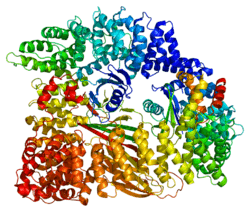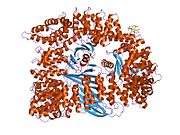Adaptor-related protein complex 2, alpha 1
| View/Edit Human | View/Edit Mouse |
AP-2 complex subunit alpha-1 is a protein that in humans is encoded by the AP2A1 gene.[3]
This gene encodes the alpha 1 adaptin subunit of the adaptor protein 2 (AP2 adaptors) complex found in clathrin coated vesicles. The AP-2 complex is a heterotetramer consisting of two large adaptins (alpha or beta), a medium adaptin (mu), and a small adaptin (sigma). The complex is part of the protein coat on the cytoplasmic face of coated vesicles which links clathrin to receptors in vesicles. Alternative splicing of this gene results in two transcript variants encoding two different isoforms. A third transcript variant has been described, but its full length nature has not been determined.[4]
Interactions
Adaptor-related protein complex 2, alpha 1 has been shown to interact with DPYSL2[5] and NUMB.[5]
References
- ↑ "Human PubMed Reference:".
- ↑ "Mouse PubMed Reference:".
- ↑ Robinson MS (April 1989). "Cloning of cDNAs encoding two related 100-kD coated vesicle proteins (alpha-adaptins)". J Cell Biol. 108 (3): 833–42. doi:10.1083/jcb.108.3.833. PMC 2115374
 . PMID 2564002.
. PMID 2564002. - ↑ "Entrez Gene: AP2A1 adaptor-related protein complex 2, alpha 1 subunit".
- 1 2 Nishimura, Takashi; Fukata Yuko; Kato Katsuhiro; Yamaguchi Tomoya; Matsuura Yoshiharu; Kamiguchi Hiroyuki; Kaibuchi Kozo (September 2003). "CRMP-2 regulates polarized Numb-mediated endocytosis for axon growth". Nat. Cell Biol. England. 5 (9): 819–26. doi:10.1038/ncb1039. ISSN 1465-7392. PMID 12942088.
Further reading
- Kirchhausen T (2000). "Clathrin.". Annu. Rev. Biochem. 69: 699–727. doi:10.1146/annurev.biochem.69.1.699. PMID 10966473.
- Goodman OB, Keen JH (1995). "The alpha chain of the AP-2 adaptor is a clathrin binding subunit.". J. Biol. Chem. 270 (40): 23768–73. doi:10.1074/jbc.270.40.23768. PMID 7559550.
- Page LJ, Robinson MS (1995). "Targeting signals and subunit interactions in coated vesicle adaptor complexes.". J. Cell Biol. 131 (3): 619–30. doi:10.1083/jcb.131.3.619. PMC 2120623
 . PMID 7593184.
. PMID 7593184. - Li C, Ullrich B, Zhang JZ, et al. (1995). "Ca(2+)-dependent and -independent activities of neural and non-neural synaptotagmins.". Nature. 375 (6532): 594–9. doi:10.1038/375594a0. PMID 7791877.
- Okabayashi Y, Sugimoto Y, Totty NF, et al. (1996). "Interaction of Shc with adaptor protein adaptins.". J. Biol. Chem. 271 (9): 5265–9. doi:10.1074/jbc.271.9.5265. PMID 8617812.
- Benmerah A, Bégue B, Dautry-Varsat A, Cerf-Bensussan N (1996). "The ear of alpha-adaptin interacts with the COOH-terminal domain of the Eps 15 protein.". J. Biol. Chem. 271 (20): 12111–6. doi:10.1074/jbc.271.20.12111. PMID 8662627.
- van Delft S, Schumacher C, Hage W, et al. (1997). "Association and colocalization of Eps15 with adaptor protein-2 and clathrin.". J. Cell Biol. 136 (4): 811–21. doi:10.1083/jcb.136.4.811. PMC 2132490
 . PMID 9049247.
. PMID 9049247. - McMahon HT, Wigge P, Smith C (1997). "Clathrin interacts specifically with amphiphysin and is displaced by dynamin.". FEBS Lett. 413 (2): 319–22. doi:10.1016/S0014-5793(97)00928-9. PMID 9280305.
- Chen H, Fre S, Slepnev VI, et al. (1998). "Epsin is an EH-domain-binding protein implicated in clathrin-mediated endocytosis.". Nature. 394 (6695): 793–7. doi:10.1038/29555. PMID 9723620.
- Berlioz-Torrent C, Shacklett BL, Erdtmann L, et al. (1999). "Interactions of the cytoplasmic domains of human and simian retroviral transmembrane proteins with components of the clathrin adaptor complexes modulate intracellular and cell surface expression of envelope glycoproteins.". J. Virol. 73 (2): 1350–61. PMC 103959
 . PMID 9882340.
. PMID 9882340. - Hussain NK, Yamabhai M, Ramjaun AR, et al. (1999). "Splice variants of intersectin are components of the endocytic machinery in neurons and nonneuronal cells.". J. Biol. Chem. 274 (22): 15671–7. doi:10.1074/jbc.274.22.15671. PMID 10336464.
- Tebar F, Bohlander SK, Sorkin A (1999). "Clathrin assembly lymphoid myeloid leukemia (CALM) protein: localization in endocytic-coated pits, interactions with clathrin, and the impact of overexpression on clathrin-mediated traffic.". Mol. Biol. Cell. 10 (8): 2687–702. doi:10.1091/mbc.10.8.2687. PMC 25500
 . PMID 10436022.
. PMID 10436022. - Vleurick L, Pezet A, Kühn ER, et al. (1999). "A beta-turn endocytic code is required for optimal internalization of the growth hormone receptor but not for alpha-adaptin association.". Mol. Endocrinol. 13 (11): 1823–31. doi:10.1210/me.13.11.1823. PMID 10551776.
- Fan GH, Yang W, Wang XJ, et al. (2001). "Identification of a motif in the carboxyl terminus of CXCR2 that is involved in adaptin 2 binding and receptor internalization.". Biochemistry. 40 (3): 791–800. doi:10.1021/bi001661b. PMC 2664867
 . PMID 11170396.
. PMID 11170396. - Wiemann S, Weil B, Wellenreuther R, et al. (2001). "Toward a catalog of human genes and proteins: sequencing and analysis of 500 novel complete protein coding human cDNAs.". Genome Res. 11 (3): 422–35. doi:10.1101/gr.GR1547R. PMC 311072
 . PMID 11230166.
. PMID 11230166. - Sakaguchi K, Okabayashi Y, Kasuga M (2001). "Shc mediates ligand-induced internalization of epidermal growth factor receptors.". Biochem. Biophys. Res. Commun. 282 (5): 1154–60. doi:10.1006/bbrc.2001.4680. PMID 11302736.
- Crump CM, Xiang Y, Thomas L, et al. (2001). "PACS-1 binding to adaptors is required for acidic cluster motif-mediated protein traffic.". EMBO J. 20 (9): 2191–201. doi:10.1093/emboj/20.9.2191. PMC 125242
 . PMID 11331585.
. PMID 11331585. - Rotem-Yehudar R, Galperin E, Horowitz M (2001). "Association of insulin-like growth factor 1 receptor with EHD1 and SNAP29.". J. Biol. Chem. 276 (35): 33054–60. doi:10.1074/jbc.M009913200. PMID 11423532.

